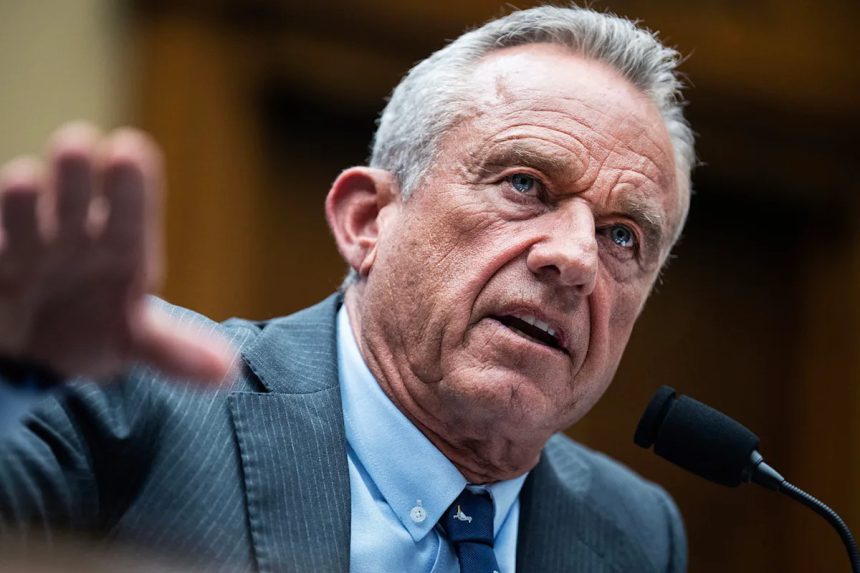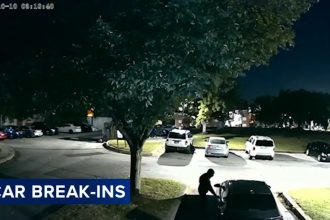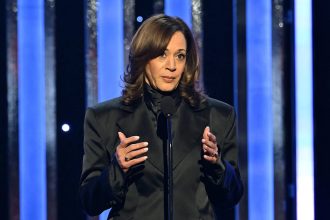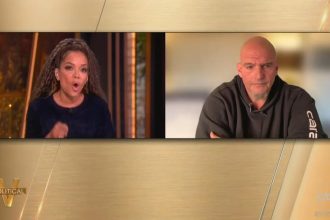On the evening of Aug. 5, Robert F. Kennedy Jr. posted a 2 1/2-minute video to X announcing that the Department of Health and Human Services was canceling some $500 million in mRNA vaccine research via 22 contracts from the department’s Biomedical Advanced Research and Development Authority.
Kennedy had spent the morning on the National Mall pedaling a bike until it generated enough power to blend a blueberry smoothie at a USDA farmers market event. Now, the secretary of health and human services was in Anchorage, Alaska, for a long-planned stop on his Make America Healthy Again tour.
While Kennedy was meeting with tribal health leaders and salmon fishing in the Alaska wilderness, scientists and public health experts were condemning the mRNA announcement in a backlash that HHS apparently had not anticipated. And over the next week, what should have been the signature accomplishment of Kennedy’s first year at HHS — the realization of a promise to end vaccines he’s falsely called deadly, even as nearly every major public health, scientific and medical body agrees they are both very safe and have saved millions of lives — became a case study in how not to sell an anti-vaccine policy in Washington. It was a week of conflicted messaging and open infighting where Kennedy irked nearly all of his allies: MAGA, MAHA, the White House and the agency he leads.
In his video, Kennedy explained without evidence that the mRNA vaccines had failed to protect effectively against upper respiratory infections.
“We reviewed the science, listened to the experts and acted,” Kennedy said.
But inside HHS, there was little sign of preparation for the policy change. Kennedy’s announcement landed without a communications plan, a fact sheet to explain the decision internally or to the White House, and without experts or agency surrogates ready to explain the decision to the public, according to three current and former HHS officials who were granted anonymity because they were not permitted to speak for the agency. Interviews with HHS officials and MAHA influencers as well as insider accounts shared on alternative media channels reveal how the mRNA scandal unfolded inside the Department of Health and Human Services, an agency plagued by dysfunction in the early months of Trump’s second term as Kennedy chips away at the nation’s public health infrastructure.
“It came out of the blue,” said one official.
While MAGA and MAHA media was processing the news, experts were posting warnings about the dire consequences that could come from the cuts. Former Surgeon General Jerome Adams said that the move would “cost lives.” Rick Bright, the former director of BARDA, the agency that had contracted the canceled research, warned it would “cripple our front-line defense.” Even the Trump-friendly National Review published an editorial with the headline “Don’t Abandon mRNA.”
MAHA supporters were vexed, too: Why hadn’t Kennedy gone further, many wondered. Why hadn’t he said what he had made clear on the campaign trail and in articles and speeches during the pandemic: that mRNA vaccines were dangerous? That they were deadly?
The White House also appeared caught off guard. Asked by a reporter on Aug. 6 how the move squared with Operation Warp Speed — the celebrated initiative that delivered the first Covid vaccines — President Donald Trump replied, “Research on what?”
When a reporter clarified the question was about the mRNA vaccines, the president said, “Well, we’re going to look at that. We’re talking about it.”
Trump praised Warp Speed as “one of the most incredible things ever done in this country,” then added: “That was now a long time ago, and we’re on to other things. But we are speaking about it. We have meetings about it tomorrow at 12 o’clock.”
A White House official declined to comment on the record or confirm whether the meeting occurred, but told MSNBC that Trump had been made aware of and supported HHS’ decision.
Kennedy’s HHS is unlike any before it. Key leadership and decision-making roles, typically held by seasoned public health officials, career managers and experienced political appointees, have been filled by anti-vaccine activists, Trump loyalists and fringe doctors and advisers. When scandal hits, as it has, they are the ones who handle things.
With Kennedy still in Alaska — accompanied by his ever-present and reportedly unpopular gatekeeper, principal deputy chief of staff Stefanie Spear — the task of damage control fell on Gray Delany, a MAHA true believer with MAGA political bona fides. A devoted staffer from Kennedy’s failed presidential campaign, Delany was hired in June as HHS’ director of MAHA implementation and external affairs, essentially a bridge in the HHS communications shop for the MAHA movement and MAGA media and activists.
When Delany came on board, the MAHA movement was already splintered. Anti-vaccine hard-liners were accusing Kennedy of selling out or slow-walking the changes he’d promised on the campaign trail while targeting food dyes and seed oils in moves that the newcomers in the health food contingent wanted but anti-vaxxers thought had little real impact. Delany’s role was as a kind of base-whisperer: coordinating with the small farmers, mom groups, anti-vaxxers and conspiracy theorists, listening to their concerns and informing Kennedy on their pet issues while bringing impatient activists back into the fold.
Trump’s press conference remarks signaled to some at HHS that the White House might reverse the mRNA decision. So, Delany crafted an on-the-fly response. Working with Dr. Steven Hatfill, a virologist, former Trump adviser and promoter of ineffective cures during the pandemic who was hired in April as a special adviser to the Administration for Strategic Preparedness and Response, Delany drafted a fact sheet to justify the cancellations, booked Hatfill on friendly MAGA shows and worked the phones to rally MAHA supporters. That afternoon, Delany joined a conference call for MAHA Action, a nonprofit dedicated to supporting Kennedy’s agenda.
“We really need our network to support this decision to amplify the message, and to have the secretary’s back,” Delany said on the call, alongside Sen. Rand Paul and Kennedy’s wife, Cheryl Hines. “There’s been a lot of back-and-forth within the movement, especially on the vaccine issue, and I just would hope that we can stay united as a movement because I think there is an active effort to divide us.”
The freewheeling public relations response continued through the night. Delany and Hatfill began preparing for an interview with Steve Bannon the next day, two HHS sources said, but were told to stand down, on Spear’s orders. They ignored her, apparently: Hatfill appeared on Bannon’s internet show, “War Room,” and framed the mRNA decision as a Kennedy promise kept.
Hatfill explained how they’d come to their conclusion. He said it had been based on a 181-page list of studies that proved widespread harm from Covid vaccines. The list — a link to which was also shared with MSNBC by an HHS spokesperson in response to questions about the data underlying the decision — was compiled by Hatfill and several other contributors who criticized health measures and vaccines and touted unproven treatments during the pandemic, including an immunologist at a Canadian veterinary college, a Namibian dentist, a cardiologist whose board certification was revoked last year and a freelance writer. That list turned into a 2024 book, “Toxic Shot: Facing the Dangers of the COVID ‘Vaccines,’” with an introduction by serial misinformer Sen. Ron Johnson, R-Wis.
That document was widely panned by experts this week.
The next day, on Emerald Robinson’s show on LindellTV — a conspiracy theory-driven network founded by MyPillow CEO Mike Lindell — Hatfill said the call had been made by his boss, John Knox, deputy assistant secretary of the Administration for Strategic Preparedness and Response (ASPR), and Kennedy. Former heads of ASPR, an agency with an expected $3.8 billion budget this year, have included physicians, public health attorneys and career military officers. Knox, a former Los Angeles firefighter and reserve deputy sheriff before that, led the group Firefighters4Freedom, which Kennedy represented in a 2021 lawsuit challenging the city’s vaccine mandate.
“There’s a new sheriff in town,” Hatfill told Robinson. “President Trump and Secretary Kennedy, and it’s my boss, John Knox at ASPR, and everyone went over the data and agreed that this had to be stopped.”
But Hatfill and Delany’s defiance had consequences. The night after Hatfill’s Bannon interview, in a move that stunned the MAHA faithful, Delany was fired after 52 days on the job. Spear had “lost confidence” in him.
“They covered up their own incompetence by firing the one guy that tried to pull something together,” Bannon told me on a call hours after Delany was sacked. “This has been a debacle.”
Delany and Hatfill declined a request for comment. HHS spokesperson Andrew Nixon said in an email that Delany “is leaving HHS to contribute to the MAHA-MAGA movement from outside the official sector.”
By Friday, HHS was still cleaning up the mess and dealing with a new crisis after a man who reportedly believed he had been harmed by a Covid vaccine fired some 500 rounds at the Centers for Disease Control and Prevention’s Atlanta headquarters, killing a police officer and traumatizing thousands of employees. Many of those CDC staff responded by calling out Kennedy for his years of vilifying their agency and spreading misinformation about vaccines, rhetoric they said contributed to the violence.
And so it was on Aug. 9 that a more subdued Jay Bhattacharya, director of the National Institutes of Health, came forward to address the mRNA question. On Bannon’s “War Room,” Bhattacharya, a Stanford health economist and co-author of the Great Barrington Declaration, distanced himself from claims that mRNA vaccines were deadly. “I’ve seen people claim that it’s caused large numbers of deaths. I’m not sure I agree with that in terms of the scientific evidence,” he said.
Instead, for the first time, Bhattacharya offered a policy rationale for the decision: “My bottom line is that the technology is promising, but not yet ready for prime time for vaccines.”
On Aug. 10, Kennedy resurfaced from his trip, posting a video selfie from the gym.
That same day, Alastair Thomson, chief data officer at the Advanced Research Projects Agency for Health (ARPA-H), which funds and manages ambitious breakthrough research, announced that he had resigned over HHS’ mRNA decision. In a now-deleted LinkedIn post, Thomson wrote that the vaccines were “demonstrably the most effective and safest vaccines ever produced by humanity.”
“I have a mantra: Data is truth,” Thomson told me in a phone interview, explaining that Kennedy’s explanation for his mRNA decision — citing the data — had been a red line. “To say the vaccines aren’t effective or safe is just completely counter to the data.”
“If data that I help generate, curate and make available is being used to make bogus decisions, then I’m complicit. And I don’t want to be remembered as the guy who provided the data for that,” Thomson said. “I don’t think the public understands just how bad this is. It threatens all mRNA research.”
Thomson’s departure was the last public sign of disarray.
On Aug. 12, Bhattacharya published an op-ed in The Washington Post, a seeming attempt to offer the mainstream justification Kennedy hadn’t delivered. “The platform has failed a crucial test,” he wrote, not because mRNA vaccines were dangerous or didn’t work, but because the public didn’t trust them.
It was the third explanation in a week. Kennedy had said the vaccines were ineffective. Hatfill said they were deadly. Now, Bhattacharya was saying they were politically unviable.
None of the explanations were accompanied by any data or the kind of gold-standard scientific assessments Kennedy has said would guide his decisions — an expected outcome for an agency marked by inexperience and led by ideologues who base policy on their false beliefs.
Inside HHS, one official summed up the mood: “They need to get their act together.”
This article was originally published on MSNBC.com









